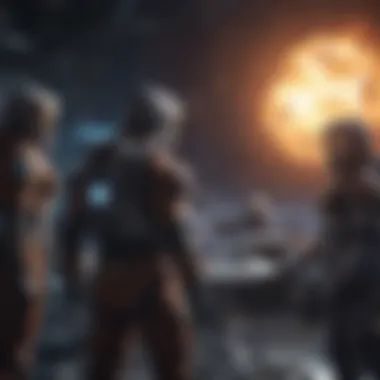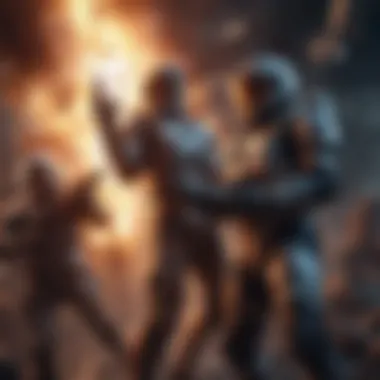Exploring the Galaxy on Fire Alliance: Strategies and Insights


Intro
The Galaxy on Fire Alliance is an extensive universe where players unite under the principles of collaboration and competition. Understanding this universe requires an exploration of its mechanics and features. This article aims to shed light on the alliance aspect of the game, which enhances the overall experience for gamers. As alliances grow, they not only alter the gameplay dynamics but also shape the community engagement. Here, we will dissect the critical elements that make up this captivating area.
Game Reviews
Overview of the game
Galaxy on Fire is centrally positioned as a space trading and combat simulation. Players assume the role of pilots in a vibrant galaxy filled with various factions and alliances. The game features an intricate storyline complemented by an expansive universe, encompassing myriad star systems to explore. Here, alliances become essential for survival and progress, influencing player interactions and strategic gameplay.
Gameplay mechanics and features
The gameplay mechanics of Galaxy on Fire are rooted in exploration, combat, and trading. Players can engage in space battles, trade goods, and undertake missions. The alliance system enables players to collaborate for shared objectives. Key features include:
- Pilot customizations: Players can modify their ships and skills.
- Resource management: Strategic allocation of in-game resources.
- Multiplayer interactions: Form alliances with other players for joint missions.
Graphics and sound quality
The graphics in Galaxy on Fire showcase detailed space environments and vivid character designs. The sound quality complements the visual experience, creating an immersive atmosphere. Spaceships roar with realistic sound effects, while soft background music sets the tone for exploration.
Pros and cons analysis
Pros
- Engaging storyline that keeps players invested.
- Rich graphical details and effective soundscapes.
- Strong community support through alliances.
Cons
- Steep learning curve for new players.
- Occasional balancing issues among factions.
Tips and Strategies
Beginner's tips for new players
For those new to Galaxy on Fire, it could be overwhelming. Here are some practical tips:
- Start with basics: Familiarize yourself with the game controls.
- Join an alliance early: This provides support from experienced players.
- Complete missions for resources: Prioritize missions that reward crucial items.
Advanced strategies for experienced gamers
As gamers become more adept, advanced strategies will be necessary. Consider these:
- Resource trading: Engage in trading to maximize profits.
- Battle coordination: Communicate with alliance members during fights to optimize tactics.
- Expand alliances: Encourage members to recruit new players to strengthen the base.
Hidden secrets and Easter eggs
The galaxy is filled with hidden content. Players should not overlook these:
- Secret missions: Some can yield rare rewards.
- Unique ship designs: Discover designs that may not typically be available.
Updates and patches overview
Like many games, Galaxy on Fire receives regular updates. These often introduce new features or fix existing issues. Staying informed about updates is crucial for improving gameplay experience.
Community Engagement Strategies
Community engagement is pivotal in Galaxy on Fire Alliance. Here are some effective strategies to enhance interaction:
- Participate in forums: Platforms like Reddit and official forums allow discussion on strategies and tips.
- Social media engagement: Connect with communities on Facebook for events and collaborations.
- Host in-game events: Create challenges within the alliance to foster camaraderie.
The strength of an alliance can define the overall success in the game.
Preamble to Galaxy on Fire
Exploring Galaxy on Fire requires a deeper understanding of its foundational elements. This section aims to provide insights into the game's universe. The overview depicts the overall setting, while the significance of alliances sheds light on their role in gameplay.


Overview of the Game
Galaxy on Fire is a distinct space trading and combat simulation game that captures the imagination of players. Set in a vast universe, it allows players to explore planets, engage in combat, and trade resources. The gameplay mechanics are streamlined yet diverse, encompassing various aspects like missions and exploration. Players are encouraged to customize their ships and evolve their strategies through progression.
One of the key aspects of Galaxy on Fire is the freedom it offers. Players can choose their paths, whether they prefer trading, piracy, or combat. This flexibility not only enhances gameplay but also encourages exploration. The unique blend of action and strategy makes it appealing for a wide range of players. The graphic design and immersive environments further contribute to an engaging user experience.
Significance of Alliances
In the ever-expanding universe of Galaxy on Fire, alliances play a crucial role. They create strategic bonds between players, allowing collaboration which is essential in both combat and resource acquisition. Players can benefit from shared resources and intelligence. This collective gameplay fosters improved chances of success in missions.
Moreover, alliances introduce a social element, enhancing player interaction and community building. The dynamics within an alliance can vary greatly, from cooperative engaging to competitive rivalries. Understanding and leveraging the strengths of these alliances can significantly impact gameplay.
"Alliances transform the solitary experience of gaming into a collaboration, enriching the overall gameplay."
Players looking to optimize their experience in Galaxy on Fire must acknowledge the benefits alliances bring. They offer resources that individuals alone may not access. The strategic uses of alliances can provide players with an edge in their gaming endeavors.
Core Gameplay Mechanics
Understanding the core gameplay mechanics is essential for anyone engaging with Galaxy on Fire Alliance. These mechanics serve as the foundation upon which player strategies are built. They influence how players interact with one another and navigate the vast universe of the game. A solid grasp of these elements leads to better decision-making and, ultimately, a richer gaming experience.
Combat Systems
Combat is a central pillar in Galaxy on Fire Alliance. Players must understand various combat systems to defend their territory or engage in offensive maneuvers. The game features space battles that require tactical thinking and quick reflexes.
Combat is not just about pressing buttons. Players need to consider the types of ships available and how their attributes can complement their strategy. Factors such as speed, firepower, and defensive capabilities all come into play.
Moreover, players should be aware of how alliances can shift the dynamics of combat. Members can assist each other by sharing intel or coordinating attacks, making it crucial to develop synergistic relationships within the alliance. This collaborative aspect often determines the success of engagements against rival groups.
Resource Management
Resource management is equally important in maintaining an effective alliance and fostering gameplay success. Players must gather resources diligently to upgrade their ships and buildings. These resources include minerals, energy, and currency, which are pivotal for ship enhancements and alliance growth.
Efficiently managing resources can be the difference between flourishing and stagnating in the game. Players should prioritize the acquisition and allocation of these assets to ensure they can support the needs of their alliance. For example:
- Collecting Resources: Regularly harvesting improves the alliance's capabilities.
- Strategic Allocation: Deciding how to distribute resources among members can foster unity and drive progress.
The importance of a strong resource management system cannot be overstated. Without it, alliances may struggle to defend themselves or expand effectively. Hence, developing a sound strategy concerning resource management is paramount for any alliance looking to thrive in Galaxy on Fire Alliance.
Building an Alliance
Building an alliance in Galaxy on Fire is crucial to enhance gameplay. These groupings not only enable players to share their resources but also facilitate collaboration during missions. An effective alliance can provide numerous benefits, serving as a backbone for individual progress and collective victories.
Creating Alliances
The process of creating an alliance requires careful consideration. Players should focus on the guild’s purpose and the type of members they wish to attract. Consideration of the game’s objectives is essential. This may include economic growth, military power, or simply social interactions.
When starting an alliance, choosing a name that resonates with potential members is fundamental. This name should encapsulate the spirit and objectives of the alliance. Setting up a distinct logo can also help establish an identity.
Furthermore, alliances in Galaxy on Fire often function better when there is a defined structure. This can include various ranks for members, ensuring clarity on roles and responsibilities.
Recruiting Members
Recruitment is a critical aspect of building a successful alliance. It is important to recruit members who align with the alliance's goals. Players can utilize several channels for recruitment, including in-game chats, forums, and social media groups, such as Facebook and Reddit.
Also, focusing on the skill levels and playstyles of potential recruits will help balance the alliance. It’s beneficial to engage with interested players to gauge their commitment and enthusiasm towards alliance goals. Offering incentives for recruitment might also be an effective strategy.
Here are some tips for effective member recruitment:
- Engage in conversation: Create personal connections.
- Provide incentives: Offer rewards for joining.
- Highlight achievements: Showcase what the alliance has accomplished.
Establishing Rules and Governance
Establishing rules and governance for an alliance is necessary for maintaining order and productivity. Clear rules help to set expectations on member conduct and responsibilities. These rules might cover participation in missions, sharing resources, and behavior in community discussions.
An effective governance structure can also enhance decision-making processes. For instance, voting on major decisions or electing leaders can involve all members. This makes everyone feel valued and encourages a sense of community.
Here are some important elements to consider in governance:


- Decision-making procedures: Clarity on how decisions will be made.
- Conflict resolution: Steps to handle disputes between members.
- Regular meetings: Schedule ensure members are engaged and informed.
Remember that a well-structured alliance can enhance enjoyment and success in Galaxy on Fire. The effort put into building this framework can significantly influence the alliance’s longevity and effectiveness.
Strategies for Alliance Success
Understanding strategies for alliance success is crucial for players invested in the Galaxy on Fire universe. Effective strategies not only enhance the gameplay experience but also significantly contribute to a player’s and alliance’s overall performance. In this section, we will explore essential elements that contribute to successful alliances, including collaborative missions, resource sharing, and the tactical implications of defensive and offensive strategies.
Collaborative Missions
Collaborative missions form the backbone of successful alliances. These missions require members to come together to achieve common objectives, helping players strengthen their cooperation skills. Participation in collaborative missions can yield significant rewards, including rare resources and experience points.
When members team up for missions, they can combine their unique ship capabilities and skills. For example, a fleet consisting of different ships can tackle a variety of challenges more effectively than a single ship acting alone. Moreover, these missions allow alliances to gauge individual player performance, fostering a sense of accountability.
Implementing regular collaborative missions fosters camaraderie among members. It enhances communication and creates a stronger bond, which is vital for the alliance's longevity.
Resource Sharing
Resource sharing is another key strategy for alliance success. Players often accumulate resources like currency, weapons, and upgrades that can benefit others in the alliance. When alliances encourage sharing, members have increased access to vital resources. This practice can alleviate resource shortages during crucial moments.
Resource sharing can occur through specific agreements within the alliance. For example, members may decide on terms for sharing resources based on need or contribution. Keeping track of resource distribution can be vital to maintaining trust.
Additionally, adopting a systematic approach to resource management can streamline sharing practices. Using tools like spreadsheets or even internal communication channels helps maintain transparency and accountability.
Defensive and Offensive Strategies
Tactical acumen is essential in battle scenarios. Defensive and offensive strategies should be well-planned to protect the alliance from rival factions while optimizing attacks against adversaries.
Defensive strategies may involve fortifying key locations within the game. Establishing defensive postures can mitigate bandit attacks or rival raids, ensuring that the alliance’s assets remain secured.
On the other hand, offensive strategies involve coordinated attacks. When members collaborate strategically to target weaker enemies or resources, they can achieve faster victories. Successful offensive maneuvers also signal strength to potential rivals, which can deter attacks.
Tactically, alliances can establish leadership to oversee operations. Deciding who leads specific missions based on expertise can result in more effective outcomes. Regular reviews of the strategies employed will help adapt to changing in-game environments.
"Success in alliances often hinges on a balance of collaboration and strategy; synergy creates strength in adversity."
By focusing on these key areas, alliances can ensure their success. Balancing collaborative efforts with resource sharing, alongside well-considered tactics, provides a robust framework for thriving in the Galaxy on Fire universe.
Community Engagement
Community engagement plays a crucial role in shaping the dynamics of Galaxy on Fire alliances. This engagement fosters a sense of belonging and collective purpose among members. By creating strong relationships, alliances enhance their cohesion and overall effectiveness in the game. Members who feel connected are more likely to participate actively, share resources, and strategize effectively during missions.
Furthermore, engaged communities can facilitate problem-solving and enhance the experience of each member. Players can exchange tips, share their successes, and voice concerns, leading to improvements in both gameplay and community morale. Effective engagement can also help mitigate conflicts that may arise from misunderstandings or miscommunications.
While engaging with the community is beneficial, it requires understanding various elements, such as preferred communication channels and event coordination approaches. Being attuned to the members' needs and preferences is key to sustained engagement and alliance growth.
Communication Channels
Effective communication is at the heart of any successful alliance. In Galaxy on Fire, various communication channels can be utilized to keep members informed and involved. Some of the most commonly used channels include:
- In-Game Chat: A direct method for members to interact in real time, share strategies, or request assistance during missions.
- Discord: This platform offers extensive features, such as voice channels and text discussions, promoting deeper discussions and collaboration.
- Forums and Social Media: Platforms like Reddit and Facebook are ideal for sharing updates, organizing events, and fostering a broader community, even outside the game.
Choosing the right channels for communication is essential. Alliances must consider their members' preferences and technological access to ensure everyone can participate comfortably. Regularly using these channels can lead to more engaged and informed members, improving overall alliance efficiency.
Event Coordination
Coordinating events within an alliance is another key aspect of community engagement. Organized events can range from cooperative missions to contests and celebrations. These activities not only bring members together but also strengthen teamwork and morale.
To effectively coordinate events, alliance leaders should:
- Set Clear Goals: Define what the event intends to achieve. This could be anything from acquiring specific resources to enhancing team spirit.
- Poll Members for Feedback: Understanding what types of events interest members can increase participation and enthusiasm.
- Create a Schedule: Establish dates and times that accommodate as many members as possible. Prior notice is crucial for ensuring availability.
"A well-coordinated event can change the dynamics of an alliance, turning a collection of players into a tight-knit community."
Like effective communication, well-planned events can lead to stronger bonds among members, ultimately elevating the performance of the alliance on the battlefield. With the right engagement practices, alliances in Galaxy on Fire can thrive and create an enriching environment for all participants.


Analyzing Alliance Performance
Analyzing the performance of alliances in Galaxy on Fire is a critical aspect that impacts both gameplay and player satisfaction. Understanding how an alliance functions and what metrics determine its success can lead to better strategies and experiences for all members involved. This section aims to dissect various elements that play a role in performance analysis, the benefits that come with it, and considerations to keep in mind.
Metrics for Success
Success in alliances can be measured using several important metrics. These metrics help players understand where their alliance stands and what improvements can be made. Here are key metrics to consider:
- Activity Levels: Tracking how often members log in and participate in missions or forums can give a clear picture of engagement and enthusiasm within the alliance.
- Mission Success Rates: Evaluating the percentage of successful missions completed collectively helps in gauging the alliance's overall effectiveness in strategic planning.
- Resource Accumulation: Monitoring the resources gathered through cooperative efforts indicates how well members are utilizing their skills and time.
- Growth in Member Numbers: A sudden increase in members can be a sign of a healthy alliance. Keeping track of inflow and outflow of members sheds light on overall appeal and management practices.
"The metrics used to measure an alliance's success define not only how well it performs but also how it is perceived within the larger community."
These metrics provide a quantitative foundation for assessing how well alliances are performing. They allow leaders to identify strengths while also revealing areas needing improvement. By focusing on these numbers, alliances can create targeted strategies for growth and success.
Evaluating Member Contributions
Member contributions significantly impact alliance performance. Each player's efforts can determine the outcome of missions and alliances as a whole. Thus, understanding how to evaluate contributions is essential.
- Participation in Missions: Evaluating how often members contribute to team missions can help identify active participants versus those who are less engaged. High participation usually correlates with higher overall success rates.
- Quality of Input: Assessing the effectiveness of individual strategies and long-term planning offered during missions can provide insights into each member's value.
- Feedback from Members: Initiating regular feedback sessions can help in understanding how well members feel their contributions are being recognized. This can affect retention and group morale.
- Conflict Resolution: Observing how members handle disagreements or issues can reveal a lot about their commitment. Those who engage positively contribute to a healthier alliance environment.
Challenges Faced by Alliances
Alliances in Galaxy on Fire offer great potential for collaboration and success, but they come with their own set of challenges. Understanding these challenges is crucial for players aiming to maximize their alliance’s effectiveness and longevity. The primary issues alliances face include conflict with rivals and member retention.
Conflict and Rivalry
One significant challenge that alliances encounter is conflicts, both within the alliance and with rival factions. Disagreements among members can arise due to differing strategies or objectives, potentially leading to internal discord. A lack of clear communication can exacerbate these tensions.
On the other hand, rivalry with competing alliances can present its own obstacles. As alliances engage each other for territory or resources, misunderstandings and hostility can develop. Rivalries may lead to intense competition, affecting morale and alliance unity. To mitigate these issues, alliances should establish effective communication channels and conflict resolution strategies. This allows members to voice their concerns and prevents minor disagreements from escalating into significant conflicts.
"Communication is key to managing both internal and external challenges within an alliance."
Member Retention
Member retention is another critical aspect that alliances must address. High turnover rates can disrupt the alliance’s cohesion and weaken its overall effectiveness. Many players may leave due to personal reasons, gameplay frustration, or a lack of engagement within the alliance. To prevent this, leaders should focus on creating an inclusive atmosphere where all members feel valued and engaged.
Regular check-ins, assigning roles that match individual skills, and offering opportunities for growth can improve retention rates. It's crucial to ensure that every member understands their importance to the team.
The Future of Alliances in Galaxy on Fire
As the gaming world evolves, so too does the concept of alliances in Galaxy on Fire. The future of these alliances holds significant weight not only in gameplay but also in community dynamics and overall player experience. Players who adapt to these changes will likely find an enhanced interaction with the game. Embracing new features and updates will become essential for maximizing engagement with fellow gamers.
Potential Updates and Features
Looking ahead, several updates and features can emerge to reshape alliances in Galaxy on Fire. These could include:
- Enhanced Communication Tools: Improvements in chat functions and voice communication options can greatly facilitate strategies among alliance members.
- Customizable Alliance Bases: Allowing players to personalize their alliance headquarters may create a more immersive experience and foster a sense of ownership.
- In-Game Events: Regularly scheduled events that require alliance collaboration can serve as motivators, helping to strengthen bonds among members.
- Alliance Reputation System: A system where alliances gain recognition through achievements could encourage healthy competition and provide a clear sense of progression.
These features, among others, can catalyze a more vibrant alliance structure, making it essential for players to keep abreast of updates to leverage their advantages.
Impact on Gameplay Evolution
The continuous evolution of alliances within Galaxy on Fire will significantly influence gameplay. As new elements are introduced, players will need to re-evaluate their strategies. The repercussions may include:
- Strategic Depth: Alliances could become even more critical for tackling challenging content. Players must strategize collectively to aim for victory in larger battles.
- Community Growth: The future of alliances can enhance social interactions, fostering a deeper sense of community among players.
- Competitive Landscape: Alliances will help shape the competitive scene, where teamwork becomes central in attaining higher ranks or completing missions effectively.
As alliances evolve, players that engage meaningfully with each other will likely shape the meta of Galaxy on Fire.
In summary, the future of alliances in Galaxy on Fire is poised for transformative changes. These updates and their influence on gameplay will require members to remain adaptable and proactive. The engagement within these alliances could well redefine the gameplay landscape and the community fabric, fostering deeper connections among players and a richer gaming experience.
The End
In the realm of Galaxy on Fire, alliances play a pivotal role in shaping the gameplay experience. Their importance transcends basic cooperation among players. The dynamics within an alliance can greatly enhance strategic depth, foster community interaction, and lead to a more gratifying gameplay journey.
Summarizing the Importance of Alliances
Alliances facilitate collaboration across various missions and challenges in the game. Here are some specific elements that highlight their significance:
- Community Building: Alliances create a space for players to connect, share knowledge, and form friendships. This social aspect can motivate players to engage regularly.
- Strategic Advantages: A well-organized alliance can devise strategies that capitalize on each member's strengths. This leads to more successful missions and engagements, contributing to the overall power of the alliance.
- Resource Optimization: Through resource sharing, alliances can achieve greater efficiency. Members can pool resources together, ensuring that no one is left behind during critical moments.
- Membership Retention: Alliances aid in holding players' attention. When members feel valued within a community, they are less likely to leave the game.
The collective strength of alliances in Galaxy on Fire enhances not only individual gameplay but the entire community's experience.
As the game evolves, the role of alliances is likely to expand. Understanding how to leverage these groups can lead to improved performance and enriched player experience. Thus, forming alliances should not just be an option but a cornerstone of any serious player's approach to Galaxy on Fire.



